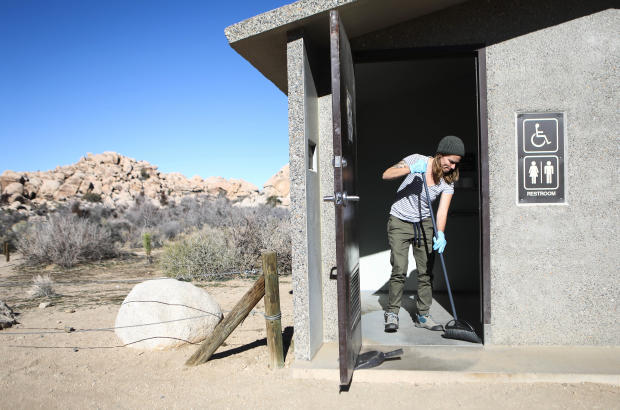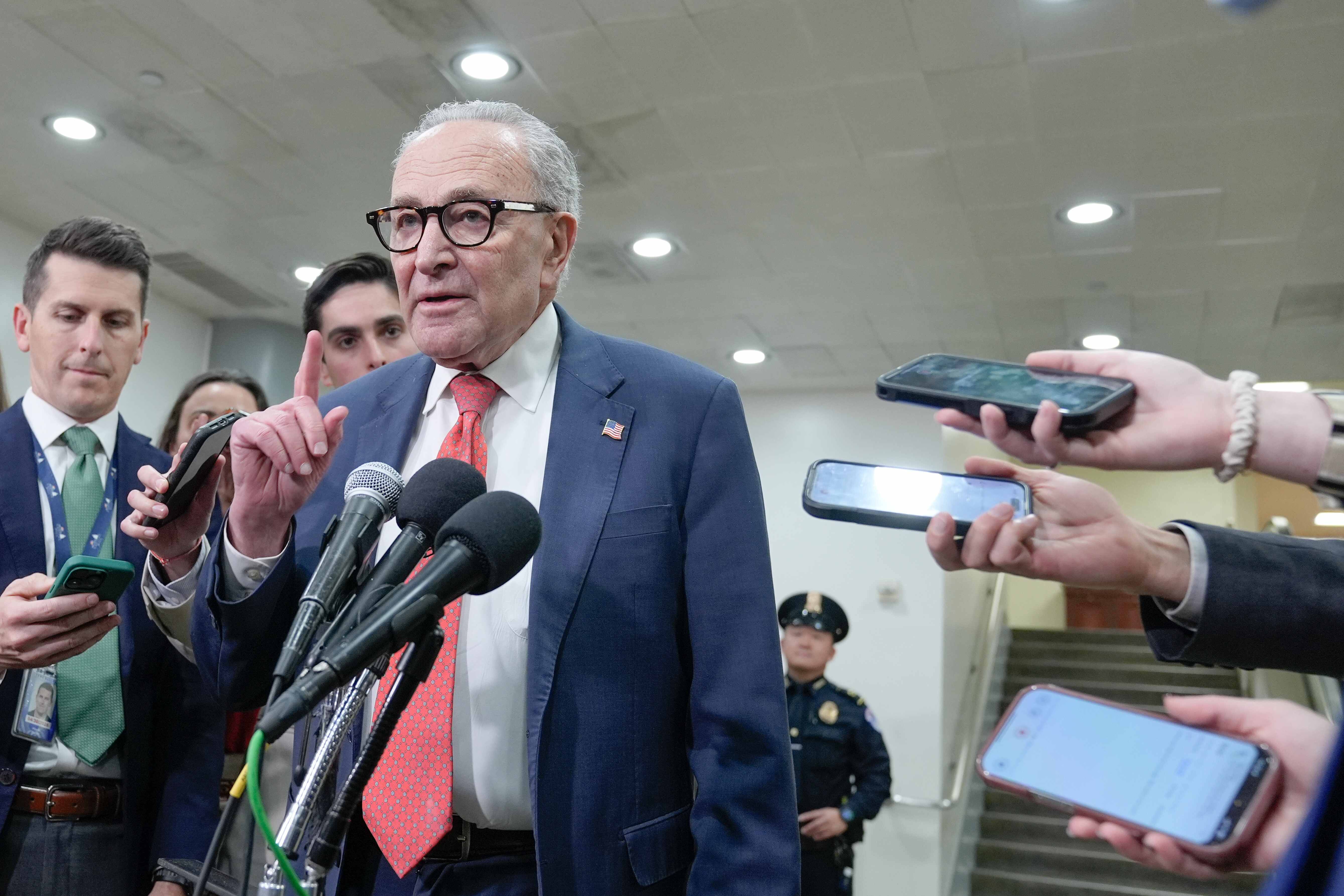What's closed during the partial government shutdown?
Kathryn Watson, Kris Van Kleave and Arden Farhi contributed reporting
The partial government shutdown began Dec. 22 after President Trump and congressional Democrats could not agree on funding for the president's long-sought southern border wall. Mr. Trump and Democrats have remained at a stalemate with no discernible progress.
The president told Democratic leaders he was willing to have the government shut down for "years" over border wall funding. The White House issued a veto threat this week on bills, known as a continuing resolutions, that would fund government through Feb. 28. That measures did not provide funding for the wall.
Nine out of 15 federal departments are closed, as well as dozens of agencies. However, several funding bills were passed and signed, so about 75 percent of government services are unaffected by the shutdown.
More than 420,000 federal employees are working without pay, including agents from the FBI, ATF, DEA and CBP, as well as staff from the State Department, Coast Guard, IRS and Department of Homeland Security.
Another 380,000 workers have been furloughed from departments including NASA, the State Department, the National Park Service, the Forest Service, the Transportation Department, the Department of Housing and Urban Development and the IRS.
Friday, Jan. 11, is the first paycheck that federal government workers missed.
Here's what is — and isn't — affected by the 2018-2019 partial government shutdown so far:
What is closed during the government shutdown
On Jan. 18, the White House Office of Management and Budget issued a directive barring flights for Congress on any "government owned, rented, leased or chartered aircraft, without the express written approval of the White House chief of staff" during the shutdown. On Jan. 17, President Trump scuttled House Speaker Nancy Pelosi's plans to fly to Brussels and Afghanistan on a codel that would have used a U.S. government plane. This came a day after Pelosi wrote a letter to Mr. Trump requesting that he either delay his State of the Union address until the shutdown is over or that he submit a written address.
The FDA hasn't been doing routine inspections of domestic food-processing facilities since the shutdown began, as the Washington Post first reported. It is working to restart inspections of what are considered "high-risk" foods. Foreign food inspections continue, as well as those at ports, and the FDA will still address recalls and outbreaks.
Right now, the FDA is trying to figure out what "high-risk" food inspections can restart. Roughly 31 percent of domestic food dealt with by the FDA with is considered "high-risk." Baby formula and seafood, for instance, are considered high-risk. The FDA does about 160 routine food inspections a week in the U.S.
The Smithsonian museums and the National Gallery of Art in Washington, D.C., shut their doors Jan. 2.
The National Zoo has closed, although animals are still being cared for by zoo workers.
Many national parks have also closed, but several remain open during the shutdown, albeit without services. Sanitary conditions have rapidly deteriorated at many of the nation's parks, with restroom toilets overflowing and trash piling up.
At Yellowstone, private companies that offer tours have been performing some maintenance, enabling them to continue operating throughout the winter, if necessary, The Associated Press reported.
Immigration courts have closed, forcing judges to indefinitely postpone hearings scheduled months in advance. There is already a backlog of over 800,000 cases.
E-Verify, the government immigration system and database employers use to check and confirm employees are eligible to work in the United States, is out of service during the shutdown. It typically takes just a few seconds for E-Verify to compare an employee's records against DHS and Social Security records.
Agencies including the NSF, the Fish and Wildlife Service, the National Parks Service, the U.S. Geological Survey, the Environmental Protection Agency, the National Institute of Standards and Technology and NOAA have had to stop most of their work during the shutdown.
Large-scale instruments like NASA's Stratoscopheric Observatory for Infrared Astronomy – the "flying telescope" – have to stop operations. Eventually bringing such instrumentation back up to speed requires over a week.
For now, the White House switchboard, (202) 456-1111, goes straight to a recorded message that says "We look forward to taking your call as soon as the government re-opens." White House staffers are not being paid because of the shutdown. The Executive Office of the President (EOP) is funded by the financial services and general government appropriations act which lapsed at midnight, December 22.
According to the White House shut down plan, about 1,068 staff are furloughed while 691 can continue working unpaid. EOP includes 13 "component" offices like the National Security Council, Office of the Vice President and OMB, for instance. Anecdotally, CBS New has seen that commissioned officers (those with a rank of special assistant to the president or higher) are working without pay, while lower ranking staff are furloughed. For the most part, the press staff have not been coming to work.
Some airlines who have taken delivery of new aircraft in the last month have been forced to park those new planes as they have to receive Federal Aviation Authority (FAA) certification to carry passengers, and the people who certify the aircraft are furloughed. That does not impact an airlines' operations, but it does cost them revenue to have planes sitting unused, CBS News' Kris Van Cleave reports.
Regional carrier Silver Airways has been particularly affected, as it is in the final phase of receiving regulatory approval to operate new ATR turboprops and has taken delivery of the first two of its ATR-42-600 fleet. Planes that are grounded due to the shutdown so they are sitting ready to go in a Fort Lauderdale hanger.
"This company has spent millions of dollars acquiring these aircraft," Furloughed FAA Aviation Safety Inspector Troy Tomey told CBS News. He's the FAA's certification program manager for Silver's new planes. "Now that whole project has been put on hold. So everybody working for the airline working for that particular certification now are waiting for the FAA to come back to work. That's costing that company if not hundreds of thousands, millions of dollars keeping those airplanes grounded."
Still open and operating during shutdown
Mail is still being delivered.
Social Security checks are still going out to recipients, and Medicare and Medicaid are unaffected by the partial shutdown.
CBS News has confirmed Dulles International Airport, serving the Washington, D.C. area, is consolidating resources and closing its West Mezzanine checkpoint, Kris Van Cleave reported Jan. 14. This marks the third airport consolidating resources. Miami closed a check point Jan. 12, and Houston's George Bush Intercontinental Airport closed a checkpoint starting Jan. 13. However, TSA suggested that its consolidation could be temporary and weather-related because of heavy snow. "TSA Dulles has call-outs attributable to the snow storm," a TSA statement said.
While TSA officers are working without pay, screeners working at the 22 airports that have private contractors handling airport security will continue to get paid during the shutdown. Most of the 22 airports that have private contractors, who operate under the oversight of TSA, are mostly small airports but include San Francisco International, Kansas City International, and Orlando Sanford Airport.
On Jan 7, the White House promised that tax refunds would not be affected by the shutdown, and later that day, the IRS confirmed it will begin to process tax returns for refunds on Jan. 28. IRS has mostly stopped working (only 12 percent of its staff had been working — without pay), and those who were working are mostly focused on security and technology, not on taxpayers' refunds. The IRS had originally planned not to be issuing refunds, updating tax forms or answering phone help lines during the shutdown. The IRS employees returning to work to process refunds will not be paid until the shutdown ends.
Federal courts are still open and operating through January 11, by relying on court fee balances and funds that do not depend on a congressional appropriation. Should the shutdown extend beyond that date, the courts would continue to operate under the Anti-Deficiency Act, in support of Article III powers. However, staffing could be reduced.
The National Hurricane Center said its website would continue to be updated and maintained because its information is needed for the protection of life and property, But the Washington Post says that some of the forecasting models it uses are not being maintained, and at least one model, the Global Forecast System, needs to be fixed.
Special counsel Robert Mueller's Russia investigation will continue because it does not depend on a congressional appropriation for its funding.
Nutrition benefits issued through the USDA, like the Supplemental Nutrition Assistance Program (SNAP) will be available through January. Other nutrition assistance programs may operate with any state and local funding resources that are available, but no other federal funds will be provided during the shutdown. Child nutrition programs, like School Lunch and School Breakfast will keep operating into February. If the government isn't opened before February, SNAP assistance could be disrupted.
Forest Service law enforcement and emergency response efforts will continue.
U.S. Citizen and Immigration Services, which deals with naturalization and citizenship, has been uninterrupted because its operations are funded by user fees.
Veterans are still receiving their benefits because the Veterans Affairs Department was among those funded through September 2019.
Passport services will still be offered during the shutdown. Passports can be renewed by mail or in person at passport agencies, post offices, libraries and other facilities, and processing times are expected to remain unchanged.
Unintended consequences
Pay raises for top officials, including Vice President Mike Pence, were reportedly set to go into effect on Saturday. But federal agencies were told in a memo issued Friday from the acting director of the Office of Personnel Management to hold off enacting the raises during the shutdown, according to The Associated Press.
The raises -- an additional $10,000 a year — were set to go into effect because a pay freeze for top federal officials was reportedly due to expire Saturday, Jan. 5. The scheduled raises appeared to be an unintended consequence of the government shutdown, The Associated Press reported.
Another potential consequence: the White House *could* have its water shut off -- since the federal government hasn't paid its $5 million bill, due to the shut down.
Matthew Brown, CEO of DC Water, told the agency at its board meeting last week that they received an email from the federal government that it would not be paying $5 million of its $16.5 million quarterly water bill.
"That brings up an interesting question," DC Water board chairman Tommy Wells said at the meeting. "Is there a time from nonpayment when we cut someone's water off?"
"1600 Pennsylvania Avenue, is that what you're talking about?" asked another board member, amid laughter.
Arden Farhi contributed to this report.






